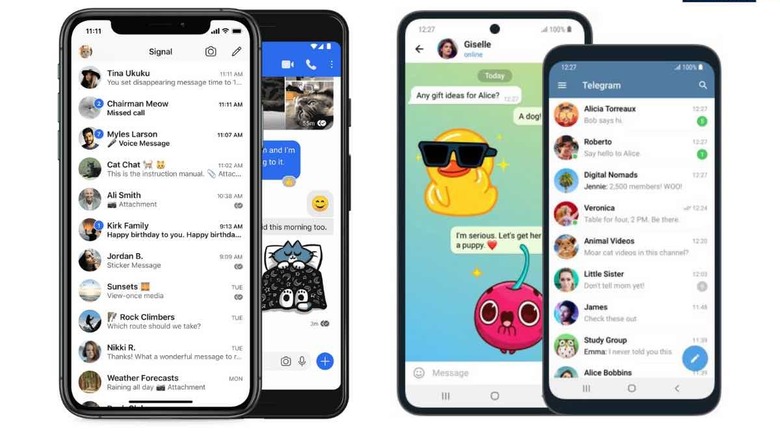WhatsApp, Telegram And Signal: What History Tells Us About Underdogs And Why It May Be Different Now

views
Everyone loves an underdog, almost always. There is an extra charm in winning a battle against all odds. That’s what is happening in the otherwise simplistic world of instant messaging apps, that you probably wasted a lot of time on every day but didn’t bother much about them beyond that. One PR debacle after another in quick succession for WhatsApp, no wonder its data guzzling habits are very much in focus of a large demographic of WhatsApp users around the world. Nothing that WhatsApp has done in the past few days has helped the user confidence, which has been shaken. It is no surprise then that WhatsApp users are downloading Telegram and Signal instant messaging apps, and in such large numbers that Signal has been the top downloaded app on the Apple App Store and the Google Play Store for quite a few days now, and Telegram is close behind on both platforms too.
The numbers support the claims that Signal and Telegram are making that they are seeing more signups and new users in a flurry, than ever before. According to the numbers by analytics firm Sensor Tower, Signal gained more than 1.2 million downloads and Telegram clocked 1.7 million downloads in the days after WhatsApp’s new Privacy Policy and Terms of Use rolled out for users. That being said, WhatsApp has still clocked 10.5 million downloads in the first 7 days of 2021, though that is 11% lesser than a week before. Telegram, according to CEO Pavel Durov, has now crossed 500 million active users globally of which around 25 million joined in the 72 hours or so after WhatsApp started rolling out the new Privacy Policy for users as an optionally mandatory accept.
While the meteoric rise of Signal and Telegram is perhaps the closest we will ever come to romanticism in the tech space, there is also the urgent need for a generous dollop of caution. Something driven by history. And to be honest, those trends aren’t exactly the most favorable for the underdog. The story of how it unfolded for two popular IM apps, in their time, doesn’t make for very favorable reading.
Remember the ICQ messenger released in 1996 and made by Israeli company Mirabilis. It was one of the first instant messenger apps as we now know them, complete with the concept of having your own contacts list. ICQ clocked 100 million registered users by 2001, but by then, its path had already switched from the one it originally set out on. ICQ was acquired by AOL in 1998 (AOL was big at the time) and subsequently sold to Mail.Ru in 2010 because AOL’s focus was on AIM, a very similar instant messaging product. That also shut down later. The owners have kept ICQ going and the app is still available as ICQ New for Android, iPhone, Windows PCs, Apple Mac computing devices and also for Huawei smartphones. It has everything that you’d expect from a large tech company based in Russia, including perceived privacy gaps.
Skype, contrary to what many who are proficient in just the recent history believe, wasn’t made by Microsoft. Created in 2003 by Estonian developers Zahti Heinla, Priit Kasesalu and Jaan Tallinn, Danish developer Janus Friis and Sweden’s Niklas Zennstrom, Skype was very much what Signal and Telegram are today – not owned by a large tech company that has business interests across a variety of domains. The app constantly grew in popularity across a variety of computing platforms, so much so that Skype became the de-facto name for video calling. Microsoft acquired Skype in 2011 and has since gone about removing the peer-to-peer functionality that was its unique point all this while and added monetization opportunities. After all, that’s what a tech company would do.
The trend for IM apps in particular has been to start out simple with a unique proposition or feature. Then build a user base over time, often years. With the increasing number of users comes increased popularity. That with it brings the attention of larger tech companies, who are always eyeing a ready-made product to monetize using their might and get a treasure trove of data from. Eventually, when the right offer comes along, the original developer sells it to a much larger corporation. The very foundations and the very personality of the app is often ripped up and everything starts afresh, step by step, to align with the new owners’ pursuit of earning profits. That’s exactly how it happened with WhatsApp as well a few years ago, when a simple and unassuming messaging app made by Brian Acton and Jan Koum was acquired by Facebook.
That being said, there is hope this time around. For starters, the very world we live in is different from the ICQ and the original Skype era. There are many more users, for instance, and the sort of potential user base numbers that weren’t possible in that era. Secondly, and specifically for Telegram and Signal, they are making the correct pitch—security. In fact, Durov recently wrote on his Telegram channel, “I hear Facebook has an entire department devoted to figuring out why Telegram is so popular. Imagine dozens of employees working on just that full-time.” He went on to say that the secret is available for free—respect your users.
That also shows the power of social media, more than anything else. When the Facebook owned WhatsApp tried to get users to tap on “agree” to a new privacy policy, the users made their voices heard. At this time, WhatsApp has delayed the implementation of the policy, though it bullishly blames users for falling for “misinformation” and that its policy is crystal clear (it doesn’t answer many big questions though).
Telegram’s 500 million users and counting is significantly more than what ICQ had at its peak—around 100 million users in 2001. Additionally, at that time, choices were few. Now, choices for IM apps on your phone and desktop are aplenty, and that very much means there is a risk of users getting fragmented and everyone getting a share of the larger pie. Yet, Telegram has stood strong. So has Signal.
In fact, the sudden spurt in user base actually caused problem for Signal with the app suffering intermittent outage for a period of 24 hours. “Like an underdog going through a training montage, we’ve learned a lot since yesterday — and we did it together. Thanks to the millions of new Signal users around the world for your patience. Your capacity for understanding inspired us while we expanded capacity,” was Signal’s witty take on the troubles they put their users through. It is all about admitting where one may have fallen short and trying to correct that.
Apart from Tesla’s Elon Musk and Paytm’s Vijay Shekhar Sharma very vocally advising their Twitter followers to download Signal and start using that, there is also a much greater pushback from users to the new WhatsApp privacy policy, than we have perhaps seen against any app or web platform. Musk has publicly said that he’s invested in the Signal app before and will do it again. This is the sort of monetization and investment that apps and developers didn’t get in the yesteryears.
Then there is the whole business positioning, which should only grow with time. In particular for Telegram, which has a feature called ‘Channels’. MobiKwik, a leading digital payments company in India, has already cut short its journey on WhatsApp for Business and is switching to Signal and Google’s communication apps. “I’m making myself unavailable on WhatsApp and I’ve advised senior executives to do the same,” MobiKwik CEO Bipin Preet Singh told Reuters.
India’s pushback against WhatsApp will hurt more than most other countries. India is WhatsApp’s largest user base—upwards of 400 million. Towards the end of 2020, the company got the permission to roll out WhatsApp Payments, based on UPI for making digital transactions, to 20 million users in the first phase. This will be competition for Paytm, PhonePe, Google Pay and MobiKwik, to name a few, and Facebook must have been betting heavily on digital payments in India. Loss of user confidence isn’t just about users using Signal or Telegram more often. It is about much more than that, particularly when the business interests are as far and wide as the Facebook Company Products.
Read all the Latest News, Breaking News and Coronavirus News here




















Comments
0 comment